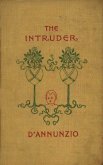Gabriele D'Annunzio's "The Intruder" masterfully explores themes of obsession, identity, and the fragility of boundaries through a lyrical narrative style that intertwines rich symbolism with psychological depth. Set against the backdrop of an early 20th-century Italy teetering on the brink of modernity, the novella delves into the psychological intricacies of its characters, particularly the haunting figure of the intruder who disrupts an intimate domestic space. D'Annunzio's vivid prose and evocative imagery invite the reader into a world of emotional turmoil, where the inner lives of characters unfold amid a poignant exploration of solitude and societal conventions. Gabriele D'Annunzio, a poet, playwright, and nationalist, was deeply influenced by the aesthetic movements of his time and the tumultuous sociopolitical landscape of Italy. His works often reflect his own preoccupations with beauty, decadence, and existential ennui, elements that permeate "The Intruder." D'Annunzio's experiences as a soldier and his engagement with the avant-garde further shaped his artistic vision, enabling him to craft a narrative that resonates with both personal and universal themes of conflict and desire. Readers seeking a profound meditation on the complexities of human relationships and the nuances of desire will find "The Intruder" an essential addition to their literary repertoire. D'Annunzio's eloquent language and insightful commentary not only challenge conventional narratives but also invite reflection on the nature of existence itself. This novella remains a striking exploration of the shadows that lie within us all.
Dieser Download kann aus rechtlichen Gründen nur mit Rechnungsadresse in A, B, BG, CY, CZ, D, DK, EW, FIN, F, GR, H, IRL, I, LT, L, LR, M, NL, PL, P, R, S, SLO, SK ausgeliefert werden.









